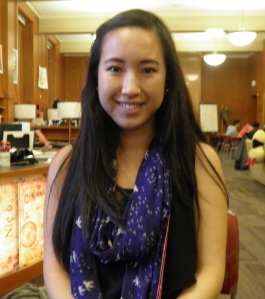Time spent studying and sometimes even doing public relations at the School of Journalism and Communication isn’t time wasted, and your portfolio should show that.
At the end of the PR sequence there comes a time where you present a variety of work you’ve done to present your story. For some, this “final” assignment can be daunting, terrifying, and can make you feel anxious as the day for Portfolio Reviews swiftly approaches. To help ease your terror, PRSSA has a run down of what to expect and how to prepare.
The Must-Knows of the Process
Here’s a short and sweet run down of how the review will go the day of:
- Arrive a few minutes early to your one-hour time slot as the reviewers start on the hour.
- Go into the room, introduce yourself, hand over your portfolio, and give a short backstory about yourself. You may want to mention things like what type of PR you are interested in.
- You will then leave the room for 10 minutes with your portfolio in the hands of the 3-4 reviewers.
- Stay close to the room and come in at the end of your 10-minute wait period to ask if they’re ready for you to present.
- Once they call you back, you will have 10-20 minutes to give your presentation.
- After your done with your presentation, you’ll leave the room again for 10 minutes. While you’re waiting outside, reviewers fill out your evaluation form and decide on feedback to give you.
- The reviewers will ask you to come back in and give you feedback on your presentation or ask you questions on your work. If you have questions for them, this is also the time to do that.
Note that you might want to bring something to take these notes down. A phone may not be the best device to do this.
Tips for a Successful Portfolio Review
Prepping for the review doesn’t mean just practicing your presentation or putting together your portfolio. There are a few other things you should keep in mind and probably execute before.
Do your homework. Think of Portfolio Reviews as a job interview ⎯ in this case an interview to graduate. The week before you have access to the review schedule. Take the opportunity to learn more about your panel. This helps put into context what each professional’s takeaways will be during your presentation.
Conduct a social media audit on yourself. If you haven’t Google searched yourself, now is the time to. You can bet that the folks who are chosen to be your reviewers will most certainly Google search you before your review session. Don’t forget to use the “grandma” rule. If you think your grandma wouldn’t appreciate a photo, post, or tweet get rid of it.
Double and triple check your e-portfolio. Attention to detail is a known attribute for any public relations professional. Make sure your first impression made online isn’t a bad one before the review.
Dress professionally and appropriately. Many students struggle when it comes to dressing professionally. It doesn’t mean wear four-inch heels you bought the day before or a suit jacket you had passed down because it’s the only “formal” thing you have in your closet. You want to look and feel the part. Reviewers know when you swung things together last minute. Follow these dress rules from Ann Taylor for women and GQ for men. Note for women: keep in mind the demographic of your reviewers. When wearing dresses, err on the side of caution.
Present your work as it pertains to your story and these three major points: the problem, solution, and impact. Each piece of your portfolio shouldn’t be there just to be there. It has to tell your story. Figure out how that piece of work relates to your overall theme or has shaped the way you perceive public relations. Remember that your materials have to tell your story without you in the room.
After your review, send them an email an hour to two hours later. Within 24-72 hours, send them a personalized thank you card. These folks are here because they care about how well you thrive in the industry. Take the time to tell them thank you for gaining valuable advice.
For more information on Portfolio Reviews, stay on the look at out on Allen Hall Public Relations’ blog. For more portfolio tips, see our post on how to jump start your PR portfolio here.
Abbie Mulligan, President, serves as the chapter’s resource and mentor, for our members and the executive board. When she’s not in Allen Hall, you can find her helping to strengthen the university’s relationship within the community. Follow her on Twitter at @abbsmulligan.







